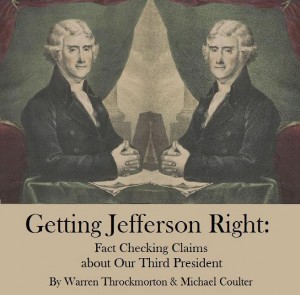Conservative think tank The Heritage Foundation publishes The Daily Signal as a conservative news source which they say is “committed to truth”

and “a reflection of that Jeffersonian notion that the greatest defense of liberty is an informed citizenry.” While a worthy goal, I believe they missed the mark recently in an article about Thomas Jefferson and another one of his notions — the separation of church and state.
In an April 12 article by Lathan Watts on why the left is wrong about Jefferson’s “wall of separation” between church and state, we learn Mr. Watts and The Daily Signal is willing to take liberties with the historical record. Let me examine two points from Watts article.
Did Jefferson Include the Bible in DC Schools?
First Watts claims that Thomas Jefferson wrote an educational plan for the District of Columbia schools which used the Bible and a Christian hymnal for instruction.
While president, Jefferson also served as the chairman of the school board for the District of Columbia, where he authored the first plan of education adopted by the city. His plan used the Bible and Isaac Watts’ hymnal as the principle books to teach reading.*
A close examination of the timeline of Jefferson’s involvement in the D.C. schools finds that Jefferson was out of office and had retired to Monticello when the schools began using the Bible and the hymnal. Furthermore, when Jefferson commented about using the Bible with children he specifically advocated against using it as a tool for teaching. In his Notes on the State of Virginia, Jefferson wrote:
The first stage of this education being the schools of the hundreds, wherein the great mass of the people will receive their instruction the principal foundations of future order will be laid here. Instead therefore of putting the Bible and Testament into the hands of the children at an age when their judgments are not sufficiently matured for religious enquiries, their memories may here be stored with the most useful facts from Grecian, Roman, European, and American history.
For a detailed analysis of the D.C. schools issue, click this link.
Did Jefferson Recommend Attendance for Soldiers at Church?
In response to a case involving religion in the military, Watts wrote:
In addition to the bills he signed appropriating funds for chaplains in the military, he also signed the Articles of War on April 10, 1806, in which he “earnestly recommended to all officers and soldiers, diligently to attend divine services.”*
Although Jefferson wasn’t theologically orthodox, he often attended church. There is some truth in these statements but the way they are worded, it makes it seem Jefferson personally recommended church to soldiers.
In 1775, Jefferson and John Adams formed a committee to craft Articles of War to guide Washington’s army. According to Adams, he and Jefferson simply took the British Articles of War and recommended them with few alterations. Years later, when Jefferson was president, Congress revised them again and sent them to Jefferson for his signature in 1806.
It is important to note that the British Articles of War which Adam’s referred to required church attendance. However, the American adaptation did not. Although recommended, soldiers were not required to attend. Also, Jefferson did not craft these tenets out of his personal preferences, he simply acquiesced to existing articles, modified slightly to give soldiers some religious choice. Adams wrote that Jefferson did not rise to speak in support of the articles but left the advocacy to Adams. In his autobiography, Adams said:
In Congress, Jefferson never spoke, and all the labor of the debate on those articles, paragraph by paragraph, was thrown upon me, and such was the opposition and so undigested were the notions of liberty prevalent among the majority of the members most zealously attached to the public cause that to this day I scarcely know how it was possible that these articles could have been carried. They were adopted, however, and have governed our armies with little variation to this day.
Saying God or Disobeying Orders?
In addition to taking liberties with Jefferson, Watts leaves out some important details about the cases presented as indicators of religious persecution. For instance, Watts links to the case of Oscar Rodriguez, Jr. and says he was removed from a military ceremony because he referred to God in a speech. However, that isn’t a complete presentation of the situation.
According to the Air Force Times, Rodriquez disobeyed orders to give any speech at the ceremony.
The Air Force Inspector General said in a September 2016 report that Rodriguez was not removed because his speech mentioned God, but because it was unauthorized.
The IG said that Rodriguez had been told multiple times that he could not deliver his speech because the ceremony was an official on-base retirement, and his speech was not the one spelled out in Air Force regulations. He was told he could attend the ceremony quietly as a guest but not as a participant.
Rodriguez ignored those instructions and stood up to deliver his speech. After delivering his opening lines, he was dragged out by four noncommissioned officers while continuing to shout his speech.
While one may debate the wisdom of these enforcement actions, disobedience to a direct order is a factor which Watts did not include in his presentation. Given that Watts wasn’t accurate about his history, I am not inclined to take his word over the Inspector General of the Air Force.
An Informed Citizenry?
Citizens who read the article will think Jefferson did things he didn’t do. If The Daily Signal is “committed to truth” and really wants an “informed citizenry” then this article should be pulled from their website.
*Both of these paragraphs are lifted nearly verbatim without attribution from William Federer’s America’s God and Country: Encyclopedia of Quotations. Once upon a time, using quotes without attribution was considered plagiarism. Especially in Christian popular writing, it seems copying work without attribution is now common place.